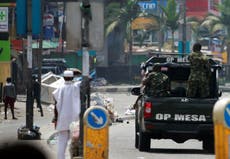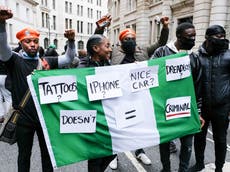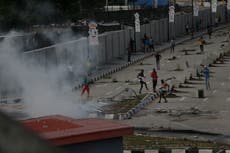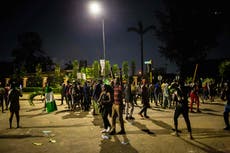The EndSARS movement is not over – we are pausing to catch our breath
We are in mourning after the tragic and traumatic events of the Lekki massacre, but our anger, pain, and frustration will fuel our fight to abolish the Special Anti-Robbery Squad in Nigeria

Your support helps us to tell the story
From reproductive rights to climate change to Big Tech, The Independent is on the ground when the story is developing. Whether it's investigating the financials of Elon Musk's pro-Trump PAC or producing our latest documentary, 'The A Word', which shines a light on the American women fighting for reproductive rights, we know how important it is to parse out the facts from the messaging.
At such a critical moment in US history, we need reporters on the ground. Your donation allows us to keep sending journalists to speak to both sides of the story.
The Independent is trusted by Americans across the entire political spectrum. And unlike many other quality news outlets, we choose not to lock Americans out of our reporting and analysis with paywalls. We believe quality journalism should be available to everyone, paid for by those who can afford it.
Your support makes all the difference.The night #EndSARS protesters were killed at Lekki Toll Plaza, an event now referred to as the Lekki massacre, I was on Instagram Live watching as the atrocity unfolded.
I remember joining on 20 October, and logging in and out. The screams of "they are killing us” rising right above the gunshots. There was chaos as people were trying to find safety and avoid the line of fire, the blood, and the fear was too much to bear. I went to Twitter and that was what everyone was talking about. I couldn’t look away.
With every new return to the live feed, an even more devastating incident took place. I watched as people wrapped wounded protesters in Nigerian flags. I sat frozen, my throat choking up, as I also watched a bullet being pulled from a man’s leg. I would leave again, and return again to see if I could try and watch through it, to see what else had happened, until the live feed ended.
Shortly after, I learnt on Twitter that many other people had been watching live as well. This is how I also found out the man with the gunshot wound didn’t survive. Reports confirm that medical aid was prevented from reaching protesters. People at the scene had tried to do the best they could with the improvised medical equipment available, and the flashlights from their phones. Nigerian authorities killed innocent citizens seeking change. This is how they put a stall on one of the most impactful movements in recent Nigerian history.
But despite the devastating events that happened during and after the Lekki shootings, the EndSARS movement hasn’t ended. The physical protests might be taking a pause, to help protect people’s safety, but the events of that night, and the protest itself still weigh heavily on many of us.
The trauma is collective, the tragedy is felt deeply across the world and the very idea of watching young people like yourself die on Instagram Live is not something we can talk about and heal from easily. Between trying to fight against the Nigerian government's denial of what happened, and hoping and demanding it admits its role in killing innocent people, nobody has had much time to do any healing.
Young Nigerians are still advocating for accountability and recently clamoured for the release of a demonstrator who was arrested and charged with protesting earlier this month. At the beginning of November, news broke of a 20-year-old journalist who was killed after making a video of a politician shooting at protesters.
A Nigerian life, it appears, costs nothing. Nobody in power is held accountable and yet we persist. We wake up each day with new depths of anger, pain, and frustration and we try again.
“For so long I’ve been surviving in Nigeria but now I’ve come to realise that this is real life and I live in this country. And it makes me angry thinking of how far the government is willing to go in order to silence us rather than agree with the terms of our demands,” a 25-year-old photographer and writer named Mobolaji Dada, tells me.
“A lot of times when I remember these incidents happened, I just feel cold. There’s just something about knowing that people died. I feel like I never did enough for the protest, that I didn’t fight enough,” says 19-year-old Itohan, another young Nigerian reeling from the recent violence.
This sense of guilt is a feeling many young Nigerians like myself share regarding the EndSARS movement. There is a feeling that we failed our peers who died. By not protesting enough or not having enough social power to get the changes we needed from the current administration, have we contributed to minimising these deaths or making them somehow permissible?
And then there is the lull. The stinging quietly, which has lasted for a month. Everyone is in a waiting period, with protesters unsure of which way is forward, or if anyone still intends to move forward.
This sentiment is further highlighted by what Olayinka Babalola, another young Nigerian, tells me. “I have been feeling a little lost, I don’t know what to do, what’s going to happen, are we just going to go back to life as we were before or is something actually going to change? But then I also feel apathy, because as much as I want change, I don’t know if I want it bad enough to put myself out there again,” says, the 27-year-old visual artist.
Many of us have not been coping, and are riddled with unexplored feelings, alone in masses of grief. “I talk to people who were at the protest with me, people I shared the experience with and who can understand how I am feeling. They are the only ones I can really talk to, I didn’t tell my family members I was going to protest so it means I can’t share how I feel with them,” Dada tells me.
“I wish I could be like, ‘oh I did yoga and went to therapy’. But nope. Calories have gotten me through, I almost picked up a cigarette habit as well. I’ve watched a lot of content, movies, series, and I didn’t shower for some time, I think I just really embodied what it meant to be a bum in the truest sense of the word,” says Babalola.
While not much is going on at the moment, in light of the current developments, it is safe to say that we are catching our breath. Some of us, myself included, have had great difficulty going back to our jobs and maintaining functionality. The only way we can move forward is to focus on other parts of our lives that bring us some joy and remind us that we can in fact be functional again. Others are simply trudging along however they are able to.
One good thing that has come from this movement is a desire for change. For a country filled with people who have long given up on the possibilities of a different reality, this is a start, a good one.




Join our commenting forum
Join thought-provoking conversations, follow other Independent readers and see their replies
0Comments